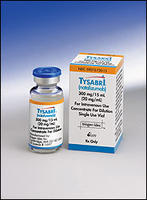 The head of Biogen Idec Inc. said in an interview Wednesday his company will recommend to regulators within a month that the warning label be strengthened on a multiple sclerosis drug the company hopes to return to the market despite safety concerns.
The head of Biogen Idec Inc. said in an interview Wednesday his company will recommend to regulators within a month that the warning label be strengthened on a multiple sclerosis drug the company hopes to return to the market despite safety concerns.James Mullen said Biogen Idec will likely recommend that Tysabri include warnings about three cases of an often-fatal brain disease that were confirmed after clinical trials of the drug, which was withdrawn from the market Feb. 28 despite hopes that it would become an important new tool in treating MS.
Mullen said the revised label that the company will propose to the U.S. Food and Drug Administration also will warn about risks for patients who have weak immune systems and therefore could be more susceptible to contracting the disease, called progressive multifocal leukoencephalopathy, or PML.
However, Mullen said the label language his company will suggest to FDA when it seeks permission to resume marketing Tysabri will acknowledge that scientists don't yet understand precisely how the bioengineered drug put the three patients who contracted PML at risk of contracting the rare disease. Two of those patients died.
"I think it's important for us to not overstate what we know," Mullen, Biogen Idec's chief executive and president, said in an interview with The Associated Press at the company's Cambridge headquarters. "We want to be concrete about what we know and what we don't know."
Mullen said Biogen Idec and its Irish partner in Tysabri, Elan Corp., plan to submit findings from their review of the drug's safety to the FDA by the end of September.
The companies had previously said the report would be submitted sometime in the fall so the FDA could review whether Tysabri can safely return to the market. Some industry analysts have said strong warnings on Tysabri's label could ruin the drug's chances of becoming a commercial success.
Mullen said it is "highly unlikely" the FDA will complete its own review by the year's end, but he said the regulators are "interested in a thorough but expeditious review of determining whether this can brought back to the market in the near future or not."
FDA spokeswoman Lenore Gelb declined to comment Wednesday.
Biogen Idec and Elan said Aug. 9 that more than 2,000 patients with multiple sclerosis who took Tysabri in clinical trials had been screened for PML as part of the companies' safety review, but no new cases were found.
The companies are close to finishing a similar review of about 1,500 people who took Tysabri in clinical trials to test its effectiveness in treating Crohn's disease and rheumatoid arthritis.
After reviewing one year of data from planned two-year trials, federal regulators in November approved Tysabri for sale to the 350,000 American sufferers of MS, a debilitating and incurable disease in which the body's immune system turns rebellious, attacking, inflaming and damaging its own nerve tissue.
The drug was withdrawn about three months after its approval, causing Biogen shares to plunge more than 42 percent the day of the announcement while Elan's stock fell 70 percent.
"We hope there is a pathway back to the market," Mullen said. "We think that unless we see some new surprises, that the risk-benefit profile for this product certainly warrants it being used for MS.
"We've got probably hundreds of letters from patients saying, 'Tysabri changed my life. I've got no other options. I'll sign whatever waiver I need to get access to this product.'" Boston.com